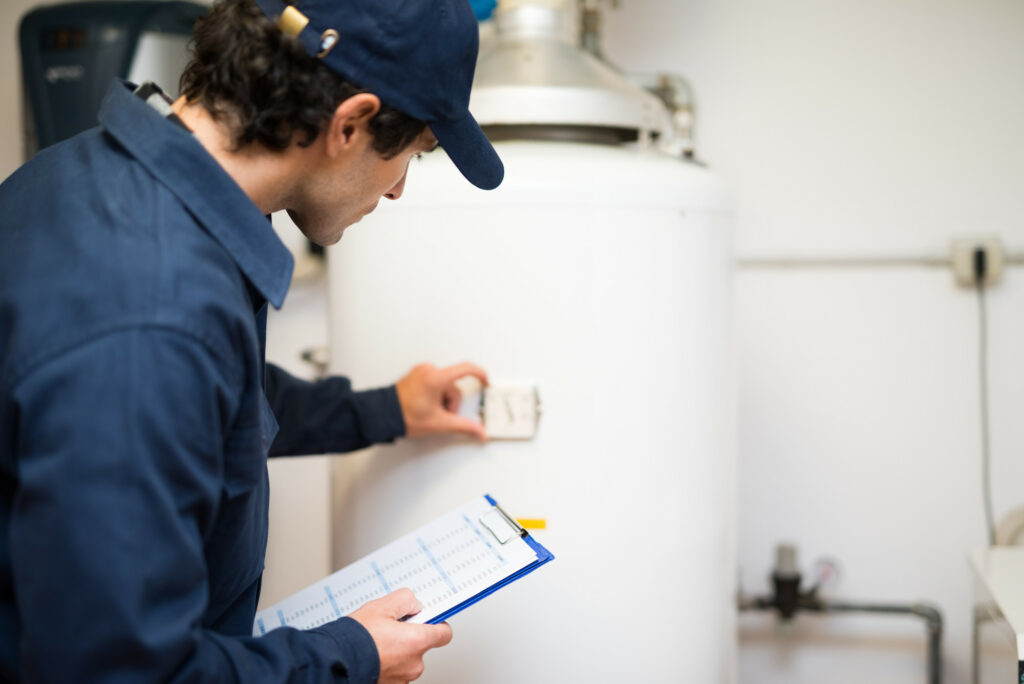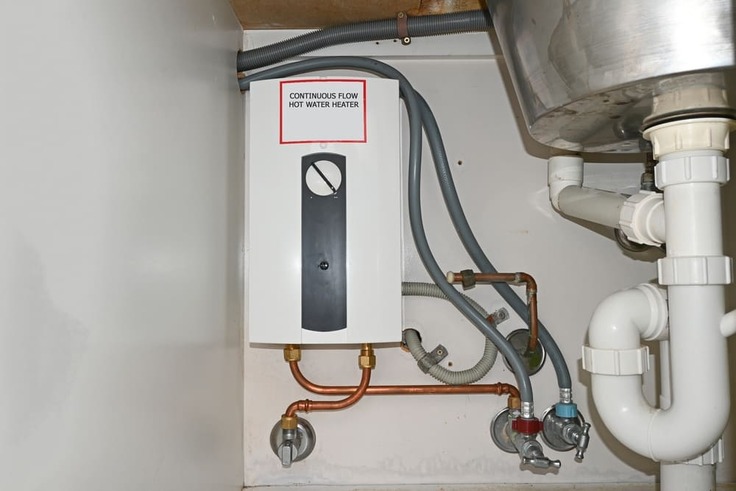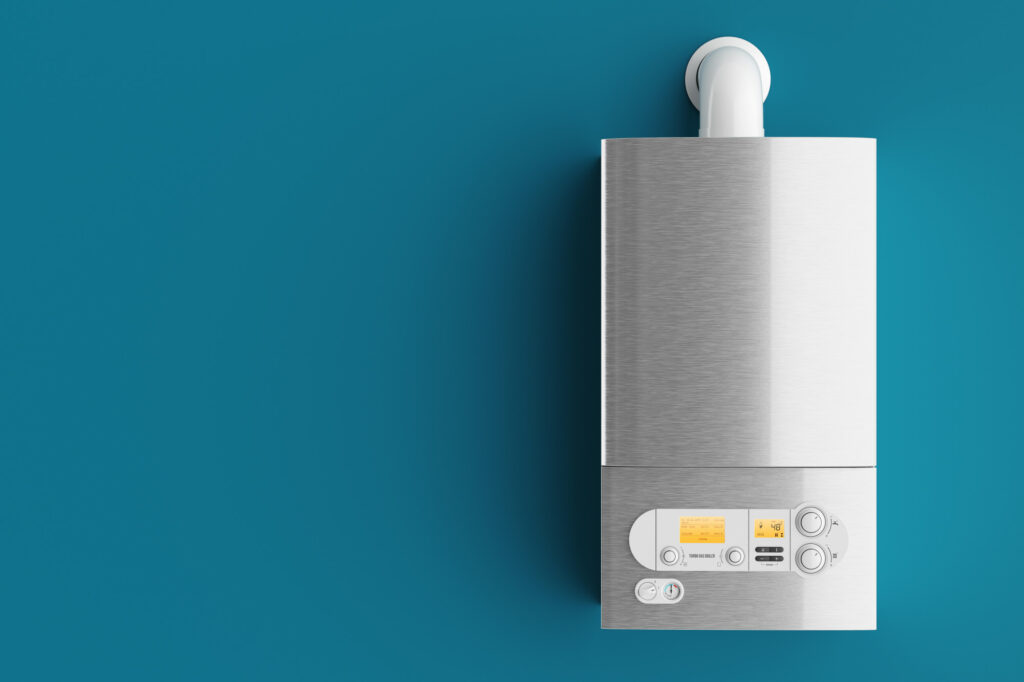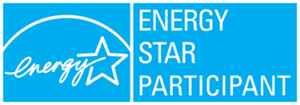Our Complete Water Heater Buyer Guide: Learn everything you need to know about the best hot water heaters before you buy, including different types of water heaters, different features, top brands, warranty options, and more.
If you’re building a new home and looking for the best water heater available, or you’re looking to upgrade your current unit, this guide will help you choose the right water heater for your needs.
With various manufacturers offering different features, units powered by different fuels and various deals and pricing options, it can become confusing purchasing a water heater. That’s why we’ve put together this informative water heater buying guide, covering what heaters are, features to look out for, reviews, warranty options, pro tips and FAQS to make sure you’ve got all the information you need!
Storage Tank Hot Water Heaters
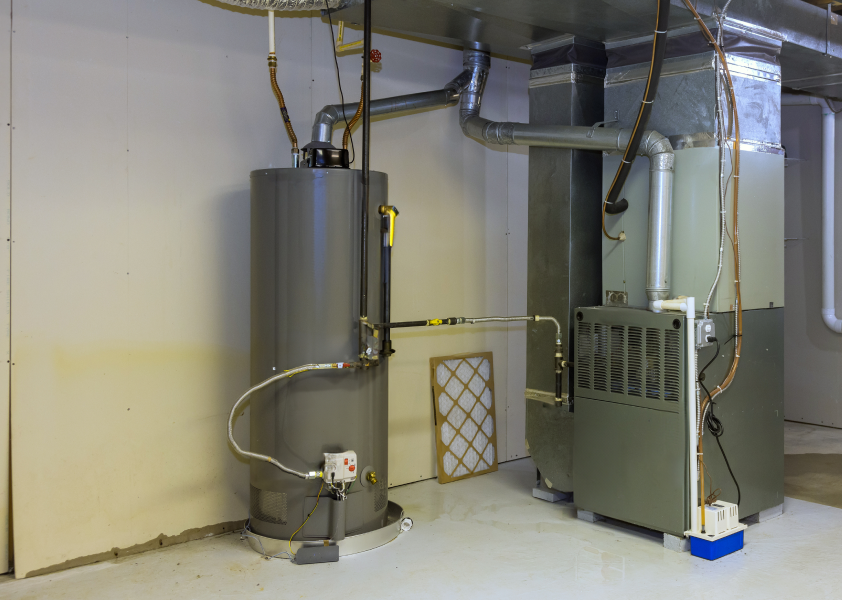
This guide will focus mainly on the traditional storage tank water heater, although it will cover tankless heaters too. See our Tankless Buyer Guide for a more in-depth overview of those systems. The storage tank water heater is the most common type of water heater in the world today, with particular popularity in the U.S. and Canada.
How Do They Work?
Traditional storage tank heaters consist of a vessel or container, usually found in the basement of a home near where the furnace is kept, and it typically holds water ranging between 75 to 400 litres.
The water heater will heat the entire content of water that’s being held in its container ready for use when called upon. They tend to be efficient thanks to the fact that they can utilize energy at a fairly slow rate as the heat is stored for later use.
However, a disadvantage to water heaters of this type is that during periods of heavy water usage, the heated supply of water in the tank can be used up. This can cause a period of delay before hot water is flowing again!
Storage tank heaters can be powered by a number of different types of fuel. Below, we have compared a number of different types of fuel for water heaters, so you can see what is best for you.
Gas
Gas water heaters are great if there’s a natural gas pipeline available to use for your home. Gas water heaters tend to be cheaper to run than electric heaters and other types, as well as being able to heat the water at a faster pace. They also benefit from the fact that they’re easier to repair than electric water heaters.
However, gas water heaters incur a more difficult installation process due to the need for ventilation due to the emissions that are released. They also tend to have a lower lifespan than an electric heater and can cost more upfront.
Electric
An advantage to electric water heaters is that they’re easier to install thanks to not needing any ventilation. They also do not run on “fuel” like gas or propane which makes them very efficient. Thanks to running on electricity, they tend to be better for the environment because they produce fewer emissions and also manage a longer service life than gas heaters.
Nevertheless, there are some downsides to electric water heaters. Electric water heaters often have a slower flow rate than a gas water heater, and you can be at risk of a short circuit or blown fuse. They also tend to be quite difficult to repair due to the electrical component.
Gas vs Electric Water Heaters
Price: Gas water heaters are usually more expensive to buy and less expensive to operate. Electric water heaters have a lower upfront cost but are usually more expensive to operate.
Efficiency: Electric water heaters are more efficient than gas ones.
Installation: Gas water heaters are more difficult to install because they need to be vented, and they also require more space because of the venting.
Fuel availability: Gas water heaters run on natural gas, but not everywhere in Canada has a direct hookup available. If you don’t, then you might be able to convert the water heater to run on propane, but then you must have the propane delivered and stored on-site.
Heating time and demand: Gas water heaters heat water faster than electric ones and are typically better suited for homes with higher hot water demands.
Safety: Electric water heaters are safer because there’s no risk of a gas leak, explosion, or carbon monoxide poisoning.
Environment: As long as your electricity comes from a renewable source and not fossil fuels, electric water heaters are better for the planet and have a lower carbon footprint.
Lifespan: Electric heaters often have longer lifespans of 10 to 15 years compared to eight to 12 years with gas water heaters.
Tankless Water Heaters vs Traditional Tank Hot Water Heaters
Although this guide focuses mainly on traditional tank-style water heaters, it’s worth mentioning tankless water heaters, which are gaining in popularity.
A tankless vs tank hot water heater can be more efficient because it only heats the water when needed and can provide nearly limitless hot water. We’ve put together the list below to help you weigh up the pros and cons of a tankless water heater.
Get Quotes
How soon are you looking to buy?*



Tankless Water Heater Pros
- They save money by not using energy throughout the day when no hot water is being called for
- Because water is heated on demand, it can be a virtually limitless flow
- They are smaller and more space efficient than tank water heaters
- Because of their smaller nature, they can be fitted closer to the areas of your home where you actually need the water, unlike tank heaters which are usually in the basement
Tankless Water Heater Cons
- It can be very expensive to switch from a tank water heater to a tankless heater. This is because you’ll generally have to retrofit your plumbing and possibly even your electrical system
- Economically, due to the expensive switch, they only really make sense if you’re building a brand-new home or adding a new space to an existing one.
- If you have an electric tankless heater and there’s a power outage, you’re left with no hot water. This is unlike an electric traditional tank water heater, as you’re still left with the pre-heated water in the tank to ration until the power is restored
Traditional Tank Water Heater Pros
- They have a lower initial cost in terms of purchase and installation
- Most contractors are familiar with tank water heaters, so it should be straightforward and less expensive for installation and repairs
- You get a steady supply of hot water, which is ideal for households with simultaneous water usage
- Doesn’t require a high flow rate to function properly
- Equipment is reliable and doesn’t require a lot of maintenance
- Available in many sizes to suit different households
Traditional Tank Water Heater Cons
- Once the stored hot water runs out, you have to wait for the tank to refill and reheat
- They’re less efficient because they’re always keeping a large tank of water hot, and even with proper insulation there will be heat loss
- Shorter lifespan of eight to 12 years compared to tankless models, which can last 15 to 25 years
- The tank takes up a lot of space, which may be an issue in smaller homes
- There’s a potential for leaks and flooding, especially as the equipment ages
Best Features To Look Out For
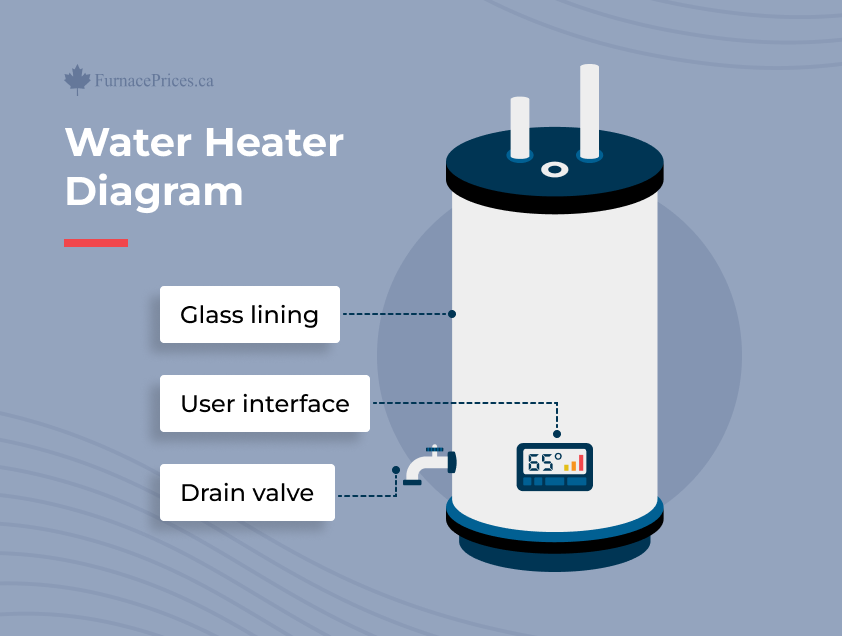
Drain Valves
Drain valves are not an expensive part of the water heater in themselves, but they’re crucial to its operation. Brass drain valves may cost more than plastic drain valves, but they’re far more reliable and effective. We suggest going for a water heater with brass drain valves where possible!
Glass Lining
Some water heaters include a glass-lined tank. The glass-lined tank helps to reduce corrosion on the interior of the tank, helping to prolong a unit’s service life and prevent maintenance issues that can be caused by corroded parts.
User-Interface
Premium water heaters include technology such as digital displays. These digital displays can show you exactly how the water heater is performing, can help you monitor your purchase and customize how it runs, and some even include a vacation mode to ensure you save money while you’re away.
Best Water Heater Brands
A.O. SMITH / GSW / JOHN WOOD
These water heater brands offer high-efficiency gas/propane, electric tank, hybrid heat pump, tankless, and solar-powered water heaters. With over 600 different models of water heaters available, there’s an option for nearly any home. Many are also ENERGY STAR certified.
These brands are all connected, for example. A.O. Smith operates under John Wood in Canada, and they’re currently the largest manufacturer and marketer of water heaters in North America. Their ProLine & Proline Master Electric models all exceed NRCan energy efficiency standards and meet national energy efficiency requirements.
They also have over 80 years’ experience manufacturing the patented glass-lined water heater – which helps reduce erosion on the interior of the tank. For example, John Wood’s patented Blue Diamond glass coating is zircon-enriched, helping provide a tougher, water-resistant lining.
The price of these units is dependent on how efficient the heater is, your home details and how much additional technology they include. It’s best to ask a wholesaler/contractor to get a better idea of pricing specific to your circumstances!
Rheem and Ruud
Rheem and Ruud manufacture gas-fired tank storage and tankless water heaters, as well as a number of other water heating items and equipment.
Higher-end models have impressive efficiency ratings, and select models are also ENERGY STAR rated. Many of these models also come with high-tech user-interface tools to help provide detailed system diagnostics and control.
There are also natural gas and propane burning models that feature eco-friendly burners with low NOx designs, helping the water heater to achieve its high-efficiency levels as well as helping the environment!
It’s worth considering the models that feature Rheem’s Guardian System air/fuel shut-off device which disables the heater in the presence of flammable vapour accumulation, increasing safety. These units are also low maintenance and require no filter.
Whirlpool
Whirlpool is one of the world’s largest home appliance manufacturers, and chances are something in your home has been made under the Whirlpool Corporation.
Whirlpool water heaters include some impressive features, such as self-cleaning technology, and numerous additional safety features. Some of these safety features include the FLAME LOCK Safety System which reduces the risk of accidental fires, 6th Sense technology which uses microprocessor-controlled Honeywell gas valves for tighter temperature control, fewer moving parts and self-diagnostic technology.
Whirlpool’s heaters also use environmentally friendly non-CC polyurethane foam insulation to reduce heat loss, and their models are certified up to an altitude of 10,100ft, great for those living at higher altitudes.
Water Heater Warranties
Depending on what model of water heater you choose, and from which manufacturer, warranties can vary. On average though, water heaters generally come with a warranty period of three to twelve years. Unsurprisingly, premium units tend to have longer warranty periods.
Installation: Setting Up Your New Water Heater
Unless you’re a certified HVAC professional yourself, we strongly recommended having an experienced HVAC company or contractor fit your water heater for you. Mistakes can be extremely costly and do damage to your home.
Depending on what water heater you’re having fitted, the installation time can vary. If you’re moving to a tankless water heater, expect it to be a larger job as often plumbing will need to be changed, and additional professionals may be required for the job.
If, however, you’re upgrading to a tank water heater of a similar type, chances are it won’t take long. Nevertheless, when choosing an HVAC service provider to install your brand-new unit, make sure to look out for their reviews, and don’t be afraid to ask about their certification. Choosing the wrong professional can be costly.
Rent or Buy: The Water Heater Dilemma
There are pros and cons to renting a water heater versus buying one, and vice versa. It really comes down to your specific situation.
Renting a water heater has lower upfront costs, maintenance is covered, and there won’t be any unexpected expenses. However, you will pay a lot more over time compared to if you buy.
Conversely, buying a water heater has a higher upfront cost but lower lifetime cost. You are responsible for repairs and maintenance, but you’ll still pay less in the end. It can also help increase your home value.
In general, if you don’t have plans to move and have it in your budget, you’re better off buying a water heater than renting. Many local HVAC companies have financing plans that can help you pay it off over time rather than in one lump sum up front.
Water Heater Costs and Average Prices

On average, storage tank water heater prices are between $1,000 – $1,300 including installation, but this depends on where in the country you live, what manufacturer and what tier of unit you decide to go for.
Tankless water heaters, on the other hand, tend to be more expensive. This is because they can mean a whole new plumbing system for your home, and that’s why, for many, a tankless water heater is best if you’re building a new home or at least an extension to your home.
On average, a tankless water heater costs around $2,000 – $4,500 including installation.
Water Heater Installation Cost
For a tankless water heater, installation costs can range from $800 to $3,000 for materials and several hours of labour.
By contrast, tankless water heater installation costs are far lower, typically ranging from $500 to $1,500 for materials and labour.
Water Heater Rental Cost
If it’s not in your budget to cover the full cost of a water heater, renting may be an option.
The average cost to rent a water heater in Canada is between $15 and $60 per month. Rental rates vary by province and depend on things like tank versus tankless, capacity, gas versus electric, and installation fees.
Get Quotes
How soon are you looking to buy?*



Financing Your Water Heater
When you put the cost of a brand-new water heater and the cost of installation together, you can be looking at a sizeable up-front cost. However, in most cases, there are financing options available to you.
Financing allows you to pay back the cost of a water heater over time, usually a number of years, with bi-weekly or monthly payments. Be wary of interest rates though, as high-interest rates can mean you pay back far more than the cost of your heater and installation by the end of your repayment period.
However, many manufacturers and HVAC companies have special promotions at certain times of the year advertising various models or services, financed, at a lower interest rate. If you’re able to pick up the model or service you’re looking for during a promotional period, you could save a lot of money!
Exploring Rebates and Incentives for Energy-Efficient Water Heaters
In Canada, 17.2% of the energy used in the average home goes toward water heating, making it the second highest contributor to energy bills behind space heating.
Investing in energy-efficient HVAC equipment is always worthwhile because it’s better for the planet and better for your wallet in the long run. Although you’ll pay more up front, you’ll pay less over time in energy bills.
There are often rebates available to help cover the additional cost of energy-efficient equipment. Organizations that offer rebates include governments, banks, utility companies, energy organizations, and HVAC companies and manufacturers.
Check out the updated list to see what water heater rebates are available in your area.
Assessing Space Requirements: Sizing Your Water Heater
Choosing the right size water heater for your home depends on the type of water heater, how many bathrooms and appliances, number of people, fuel type, and hot water usage patterns.
To determine what size storage tank water heater you need, you must consider two key figures: A) How much water you use at the busiest time of day; B) the first hour rating.
During the busiest time of day, think about how many people are showering, doing laundry, washing dishes, running the dishwasher, or putting other demands on the water heater. Calculate how much hot water your household uses during peak demand. Here are some general numbers to help you calculate:
| Water-Using Activity | Gallons of Water |
|---|---|
| Washing machine | 10 to 30 |
| Showering | 10 to 15 |
| Dishwasher | 6 to 10 |
| Washing hands or face | 1 to 3 |
| Shaving | 2 to 3 |
| Bathroom/kitchen faucet flow rate | 2 per minute |
When you’re shopping for water heaters, keep that number in mind and match it with a system that has a similar first hour rating (FHR). The FHR is the amount of hot water, in gallons, a unit can supply in the first hour of operation when starting with a full tank.
To recap: You need a water heater with a first hour rating that can handle your home’s hot water demands during peak usage.
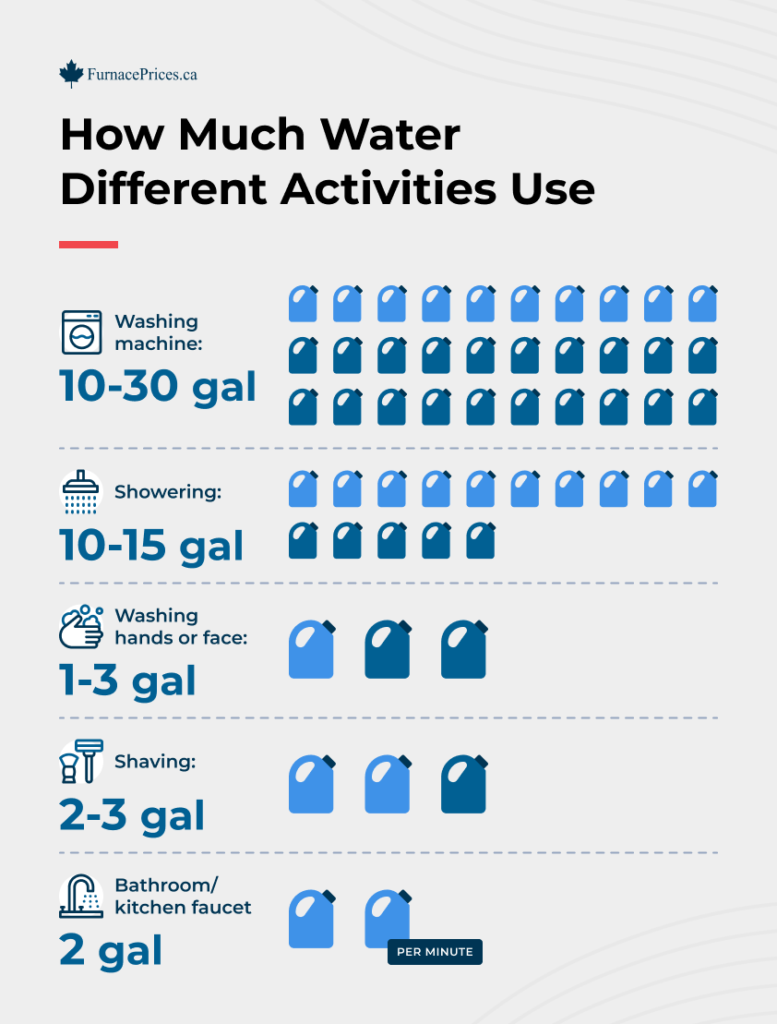
New Water Heater Pro Tips
Insulate
One of the downsides to tank water heaters is that once the water is heated, it slowly cools over time causing the need for more energy to heat the content back up. To slow the rate that water cools, consider insulating the pipes around the heater.
So, if you’re looking to save money on your monthly water heating bill, consider insulating your hot (and cold) water pipes that are within 2 to 3 meters of your water heater. This is one of the most effective improvements you can make to your existing or new storage tank water heater!
Check Your Water Heater Settings
Most water heaters allow you to set the maximum temperature the water in your home can be heated to. If you’re worried about leaving your tap running on maximum heat and then sticking your hand under it, then it may be worth turning down the maximum heat on your water heater.
A lower maximum heat is safer, and this is particularly the case if you’ve got children in your house. But also, by turning down the maximum temperature your water heater can reach, you can save money too! A lower maximum temperature means less energy wasted as you’re heating your water to the temperature you want from the start.
However, be wary of the fact that setting your water heating temperature too low can lead to a growth in bacteria in your water system, as the hot water can help prevent things such as legionnaires’ disease. If in doubt, seek out a professional opinion who can evaluate your home and needs personally.
Your New Water Heater
Buying a new hot water heater is a substantial investment for your home. Whether you’re replacing your old unit or building a brand-new property, we hope this guide has helped you make an informed choice. Remember, take your time when purchasing a new heater – deals are always available, and it’s a good idea to shop around before making a purchase!
Maintenance Tips for Prolonging Water Heater Lifespan
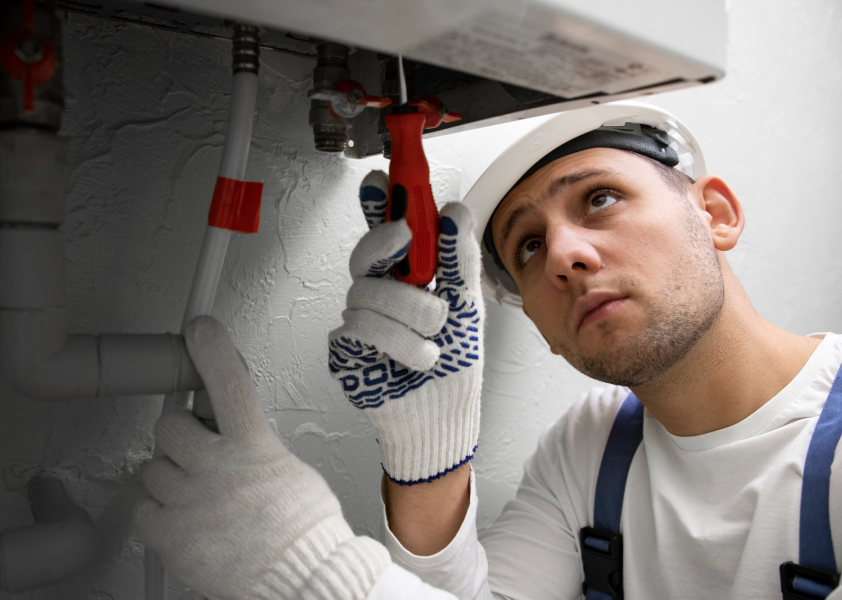
A storage tank gas water heater has an average lifespan of eight to 12 years, and regular maintenance will help give it the longest life possible. Regular maintenance for a water heater includes:
- Flushing the tank annually
- Checking the anode rod for corrosion every couple of years
- Testing the temperature and pressure relief valve annually
- Checking regularly for leaks and corrosion
- Inspecting the gas connections and burner
- Scheduling an inspection with a professional HVAC technician every few years
Addressing Hard Water Issues: Impact on Water Heater Performance
Hard water has high concentrations of minerals like calcium and magnesium. The minerals can build up in the system and significantly impact a water heater’s efficiency, lifespan, and performance in the form of:
- Reduced water pressure
- Increased maintenance
- Longer heat-up time
- Lower efficiency
- Strange noises
- Blockages
- Shorter lifespan
Prevent damage and reduced performance from hard water by:
- Taking care of regular maintenance
- Flushing the tank every six months
- Lowering the temperature to 120°F / 49°C
- Installing a water softener
And when it’s time to replace your water heater, look for one with corrosion-resistant features.
Exploring Hybrid Water Heating Solutions
A hybrid water heater is a heat pump water heater that extracts heat from the air and transfers it to the water in the tank to provide domestic hot water.
One of the main benefits of these systems is their efficiency. Heat pump water heaters with ENERGY STAR® certification use up to 70% less energy compared to standard electrical water heaters.
Heat pump water heaters are also environmentally friendly, have a long lifespan, and can handle high demand. And some hybrid water heaters can switch between heat pump heating and regular electrical heating during periods of high demand.
However, they are more expensive than conventional water heaters, require more space for installation, and typically work best in mild/warm climates.
Water Heater Frequently Asked Questions
What are the signs that my hot water heater needs replacing?
There are a few key signs to look out for that may suggest that you could do with an upgrade to your hot water heater – The water that’s coming from your taps or shower is discoloured. This could mean that there’s debris or dirt such as rust in the storage tank. If your hot water heater does not perform to the same standard as when you first purchased it, for example, it takes a long time to heat up. If your hot water bills have been steadily increasing or have recently dramatically increased with no explanation. If you can see leaking around the bottom (or anywhere) from your water heater. Your heater is making more noise than usual on a daily basis.
Will my hot water heater work during a power outage?
This depends on your model of hot water heater. An electric hot water heater will stop working during a power outage. However, a gas water heater (if it has a continuous pilot light) may keep working during a power outage.
My home has high water pressure, what can this do to my water heater?
If your home has a high-water pressure, for example, over 80 psi, then it could damage your home’s pipes and appliances as well as putting additional strain on your water heater. Consider purchasing a pressure reducing valve for your home’s water system.
What is the first-hour rating?
The first-hour rating indicates how much hot water your water heater can produce over an hour if it starts with a full tank of hot water. Gas water heaters tend to be better in this regard than electric water heaters. Look out for these ratings if your home uses lots of water in a short period of time.
There is a strange smell coming from my water heater, what should I do?
Egg smell – If there is an egg or sulfur-like small, you may need new sacrificial anodes in your tank. These active metals help prevent the material surface from corroding which also helps to stop the smell. Gas smell – Turn off the gas supply to the hot water tank (if it’s safe to do so) and leave the area and call a gas professional.
Can my hot water heater freeze?
It’s very unlikely that your hot water heater will freeze, even during the Canadian winter. If you’ve found that there’s no water coming from your taps or shower, it’s more likely that a pipe to or from your hot water heater has frozen.
How long for a hot water tank to heat up?
The amount of time varies depending on the type of water heater and its capacity, but it can take anywhere from 30 minutes to three hours. For most gas water heaters, the recovery time is generally 30 minutes to an hour.
What are the safety precautions to consider when installing a hot water heater?
We do not recommend installing a water heater by yourself. You risk damaging the unit, improper installation, shortened lifespan, voiding your warranty, and endangering your family and home (gas water heaters can, in fact, explode). Further, you need special licensing or certification in Canada to install gas appliances.
What are the energy efficiency ratings on a hot water heater and how do they impact my energy bills?
Water heater efficiency is typically measured by uniform energy factor (UEF).
Electric storage tank water heaters have an average efficiency of 0.87 to 0.95 UEF, and tankless electric from 0.90 to 0.99 UEF.
Gas storage tank water heaters have an average UEF of 0.50 to 0.70, and tankless ones from 0.80 to 0.99 UEF.
The higher the number, the more efficient the system. The more efficient the system, the less money you’ll pay on utility bills.





